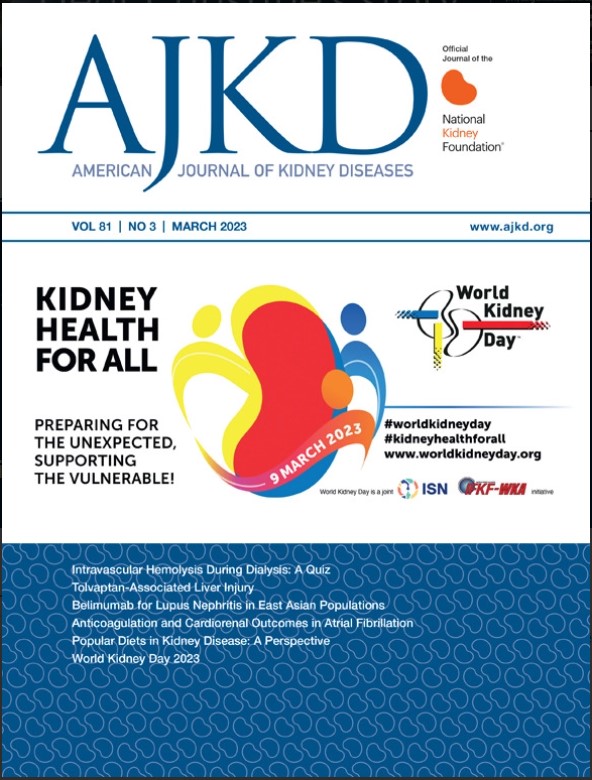单等位基因IFT140变异导致儿童期常染色体显性多囊肾病
IF 8.2
1区 医学
Q1 UROLOGY & NEPHROLOGY
引用次数: 0
摘要
IFT140是鞭毛内转运复合物a的一个组成部分,参与蛋白质向初级纤毛的逆行转运。单等位基因IFT140变异已被确定为成人发病的常染色体显性多囊肾病(ADPKD)的一个重要原因,占流行病例的2%。ADPKD-IFT140患者通常在晚年出现少量大囊肿,很少发生肾衰竭。在这里,我们报告了3例遗传解决的ADPKD-IFT140病例,诊断于儿童期或婴儿期,来自3个不相关的家系,发病年龄从子宫到14岁不等。每个家系都有不同的家族性IFT140变异,全基因组测序未发现第二个ADPKD基因变异的证据。所有3名儿童肾功能和血压正常,尽管1名儿童最初在子宫内表现为高囊肿负担,DMSA扫描显示功能受损。尽管有阴性家族史,一级亲属级联筛查发现以前未确诊的ADPKD具有成人发病ADPKD- ift140的典型特征。我们的研究结果强调需要考虑IFT140作为儿童早发性ADPKD的潜在原因,并扩大ADPKD-IFT140的表型谱。本文章由计算机程序翻译,如有差异,请以英文原文为准。
Monoallelic IFT140 Variants Causing Childhood-Onset Autosomal Dominant Polycystic Kidney Disease.
IFT140 is a component of the intraflagellar transport-complex A involved in retrograde ciliary trafficking of proteins into primary cilia. Monoallelic IFT140 variants have been identified as an important cause of adult-onset autosomal dominant polycystic kidney disease (ADPKD), accounting for ∼2% of prevalent cases. Patients with ADPKD-IFT140 usually present in later life with small numbers of large cysts and rarely develop kidney failure. Here, we report 3 genetically resolved cases of ADPKD-IFT140 diagnosed in childhood or infancy from 3 unrelated pedigrees with ages at presentation ranging from in utero to 14 years. Each pedigree had a different familial IFT140 variant, with no evidence of a second ADPKD gene variant on whole genome sequencing. All 3 children had normal kidney function and normal blood pressure, although 1 child presented initially with a high cyst burden in utero and had impaired function on a DMSA scan. Despite the negative family history, cascade screening of first-degree relatives revealed previously undiagnosed ADPKD with features typical of adult-onset ADPKD-IFT140. Our findings highlight the need to consider IFT140 as a potential cause of childhood early-onset ADPKD and expand the phenotypic spectrum of ADPKD-IFT140.
求助全文
通过发布文献求助,成功后即可免费获取论文全文。
去求助
来源期刊

American Journal of Kidney Diseases
医学-泌尿学与肾脏学
CiteScore
20.40
自引率
2.30%
发文量
732
审稿时长
3-8 weeks
期刊介绍:
The American Journal of Kidney Diseases (AJKD), the National Kidney Foundation's official journal, is globally recognized for its leadership in clinical nephrology content. Monthly, AJKD publishes original investigations on kidney diseases, hypertension, dialysis therapies, and kidney transplantation. Rigorous peer-review, statistical scrutiny, and a structured format characterize the publication process. Each issue includes case reports unveiling new diseases and potential therapeutic strategies.
 求助内容:
求助内容: 应助结果提醒方式:
应助结果提醒方式:


